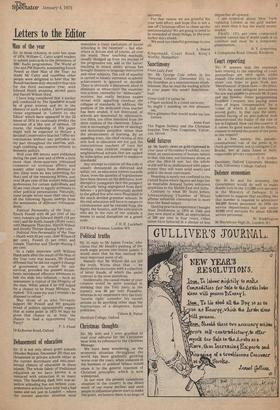Man of the year
Sir: In these columns, in your last issue of 1974, William C. Catto urged readers to submit postcards to the presenters of BBC Radio programmes, The World at One and PM Reports, nominating Enoch Powell as their Man of the Year; no doubt Mr Catto and countless other people were delighted to hear that Mr Powell has been duly elected to that title for the third successive year with Edward Heath attaining second place and Harold Wilson third.
I have long considered that a similar poll conducted by The Spectator would be of great interest and so, in the absence of such a ballot, I have utilised views expressed in 'Letters to the Editor' which have appeared in the 52 issues of 1974 to cautiously predict the outcome of a like test of opinion. Of course, the readership of this paper might well be expected to declare a decided Conservative bias but I offer my conclusions without any prejudice on my part throughout the exercise, although confining my concern entirely to domestic politics.
Well over 650 letters were Published during the past year and of these a little more than three-quarters contained comment on overseas affairs and sundry other topics from abortion to zinc (they were no less interesting for that) and of the remaining letters, just over 38 per cent of the writers indicated preferences for certain individuals and 42 per cent chose to signify aversions to other political personalities. Naturally, some people wrote more than once but all the following figures emerge from the sentiments of different correspondents:
Political Personality of the Year — Enoch Powell with 66 per cent of the vote; runners-up Edward Heath (19 per cent) and Sir Keith Joseph (10 per cent), with Margaret Thatcher, Harold Wilson and Jeremy Thorpe sharing 5 per cent.
Political Non-Personality of the Year — Heath with 82 per cent, then Wilson (8 per cent), Powell (5 per cent) and Joseph, Thatcher and Thorpe sharing 5 per cent.
In a radio interview with William Hardcastle after the result of the Man of the Year vote was known, Mr Powell affirmed that he did not regard a change of government as crucial for our survival, provided the present incumbents introduced effective measures to halt the slide into inflation — such an assessment is typical of the integrity of the man. When asked if he still hoped for a chance to be Prime Minister, he replied: "If it came my way I wouldn't be disposed to refuse."
May those of us who fervently support Mr Powell and his genuine brand of politics optimistically expect that at some point in 1975 he may be given that chance or, at least, the chance to lead a rejuvenated Tory Party?
F. S. Flood 19 Kelburne Road, Oxford


























 Previous page
Previous page